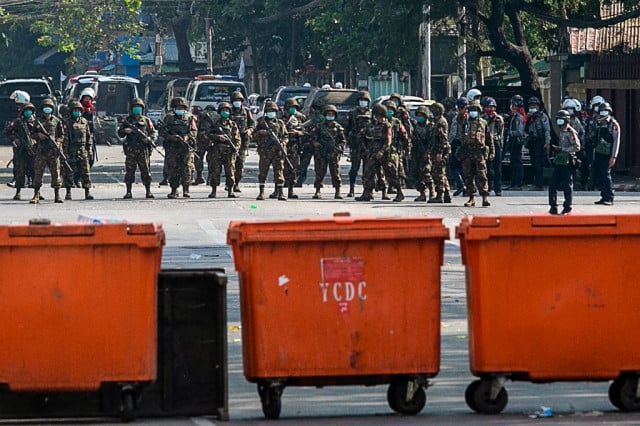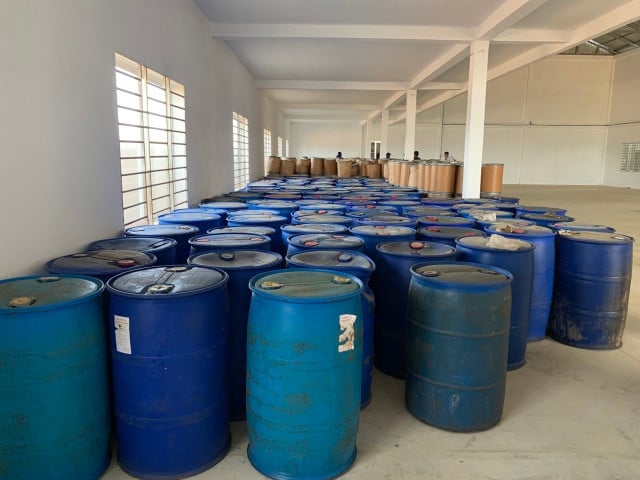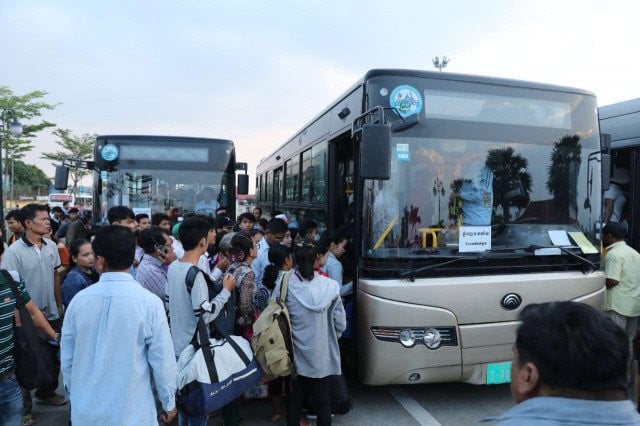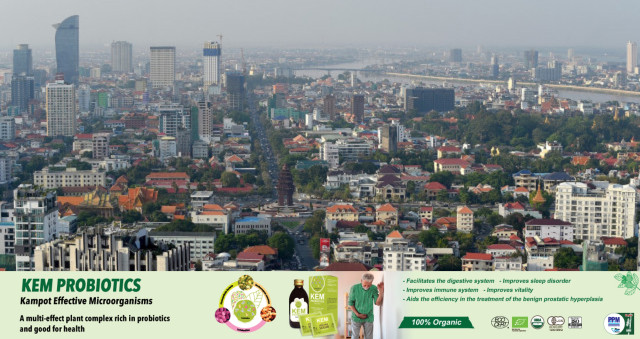The Winter Is Coming for The Tatmadaw

- Rim Sokvy
- March 19, 2021 6:21 AM
After the military Junta took power from the civilian leaders on 1 February 2021, the country is experiencing chaos and instability. The military detained senior politicians and the elected leaders of the National League for Democracy (NLD) who won a sweeping victory against the opposition-backed military during the national elections in November 2020, while all the powers – legislative, executive, and judicial – were transferred to Min Aung Hlaing, the top military commander-in-chief. The military has used the widespread alleging voting fraud to justify their military action, which is based on Section 417 of the constitution mandate drafted in 2008 by the military, allowing the military to take control in time of emergency.
Motives behind the Military Coup
However, the military coup is due to the fear of facing trial after losing all power, according to BBC News, Min Aung Hlaing is nearly 65 now and is reaching the age of retirement in July this year. Stepping down from his position as the military commander-in-chief would consequently make him vulnerable to the accusation of committing crimes against humanity. Min Aung Hlaing who is also known as “a battle-hardened warrior of brutal Burmese Army” was condemned by the international communities and was sanctioned twice by the US and UK in 2019 over the intensified crackdown on the Rohingya, an ethnic minority group in the Rakhine State, that led 700,000 of Rohingya fleeing the country. According to the statement released by the UN Human Rights Council in August 2018, "Myanmar's top military generals, including Commander-in-Chief Senior-General Min Aung Hlaing, must be investigated and prosecuted for genocide in the north of Rakhine State, as well as for crimes against humanity and war crimes in Rakhine, Kachin and Shan States.". Relinquishing his position from the top military general would means that executing by the international community is inevitable.
The military’s commander-in-chief also hopes to protect his family and military financial interest from the possible investigation when losing all his power. According to Amnesty International, Min Aung Hlaing has ultimate control over the two military conglomerates, Myanmar Economic Corporation (MEC) and Myanmar Economic Holdings Limited (MEHL), allowing the top military to profit financially from it. For instance, from 2010 to 2011, Min Aung Hlaing received $250,000 in profit from his 5,000 shares of joining ventures. In addition, his son and daughter also own an exclusively giant business in Myanmar. The investigation could happen if the civilian leaders gain more power because the NLD’s senior members including Aung San Suu Kyi view the military as an impediment to a democratic transition. Reducing military financial independence would potentially reduce the military capacity and influence, according to the reports of the United Nations in 2019 found that MEC and HEHL have significantly contributed to the military power.
The situations had been deteriorating on Sunday as the military brutally cracked down on the civilian that led to the death of over 126 people and thousands of people had been detained. According to Reuters, Schraner Burgener, the top UN envoy to Myanmar told Soe Win, Myanmar’s deputy military chief, Myanmar would face sanctions and retaliation from the international community. His response is shocking “We are used to sanctions, and we survived”. He added that “We have to learn to walk with only a few friends”. With this commitment from the military, it is unlikely that the democratization process in Myanmar would get back on track so easily.
International Pressures
The military coup in Myanmar was motivated by the belief that there would be no serious response from domestic and international actors, Sebastian Strangio argued. Though the military justifies the coup by referring to the voting irregularity, a series of condemnations and responses are followed. The military coup has been perceived as illegal and the transition to democracy is necessary which is urged and condemned by the international communities and superpowers. For instance, on 5 February, the UN Security Council issued a statement to express “deep concern” and demand the “release of detainees” including all the NLD’s senior political members. This rare unity of the 15 members of the UNSC is the reflection that China and Russia also concern about the situation in Myanmar.
Unsurprisingly, the transition of power to the military Junta would be a big loss for China even China opposed the UNSC decision to condemn the military Junta. Historically, the Tatmadaw always had mistrust relations with communist China, for instance, in 2011 Tein Sein government suspended the construction of the Myitsone dam and other Chinese projects due to the fear of Chinese influences, which made China suffered a serious financial loss. The Sino-Myanmar trade relations have deepened only during the civilian government led by Aung San Suu Kyi. China became one of the most important sources of investment in Myanmar, which approximately around 25% of the total foreign direct investments (FDI) in Myanmar are from China. The trade volume also reached USD168 billion in 2019 which was only USD 11 billion in 2004. This indicates that Myanmar under the NLD government is more beneficial to China, especially its Belt and Road Initiative (BRI).
The US and its western allies have imposed targeted sanctions on the top military leaders including Min Aung Hlaing, who led the coup. Though sanctions have already put in place since 2019 when there was an ethnic cleansing against the ethnic minority in the Northern provinces, it could be more serious this time since the sanctions also apply to any other companies that have economic connection with the Tatmadaw’s business. This could be a fatal blow on the military conglomerates, MEC and MEHL, which has joined ventures with many companies and multi-national corporations. Recently some giant companies, particularly Japan’s Kirin Holding, Thailand’s Amata, and Suzuki Motor have suspended and abandoned their economic partnership with the MEC and MEHL. This could make the military leaders suffer financially since MEC and MEHL have been bankrolling the military so far. Within the Association of Southeast Asian Nations (ASEAN) itself, though some states refuse to express opinions or concerns because of the ASEAN ways of non-interference and consensus, they do not show any tendency of supporting the military leaders. Some maritime ASEAN member states, particularly, Indonesia, Singapore, Brunei, and Malaysia have expressed concerns regarding the military coup that it could have a spill-over effect on the association as a whole. ASEAN members would find any measure to put pressure on Myanmar to settle the dispute peacefully since the political instability among its member would be stagnated for the association to move forward.
Domestic challenges
Domestically, Myanmar’s people have protested against the military which they view the coup as illegitimate. Since the military coup in the early morning of 1 February, there have been widespread riots and demonstrations within the country. Not only the normal citizen but also Myanmar’s ambassador to the US, Kyaw Moe Tun, urged the UN member states to use “any means necessary” to reverse the coup of 1 February. The recognition of Kyaw Moe Tun by the UN General Assembly and the US even he has been fired by the military government, implies that the defector leaders, Aung San and other seniors members of NLD remain the only legitimate government which recognizes internationally.
The disorder and riot in Myanmar could pose threats to the military government, which the ethnic minorities could reclaim their own autonomous regions. Myanmar is one of the most diverse ethnic minorities and powerful armed group militias in the world. For example, the Karen National Union (KNU), the ethnic minority in Kayin, have endured an endless arm struggle with the government since the time Myanmar gained independence. Despite there is a cease-fire agreement in 2015, a skirmish erupted frequently. The armed clash in 2020 made more than 3,000 Karen villagers flee their home. Most of the ethnic minority groups harbor resentment and hatred toward Myanmar’s military government, which their political, social, and economic freedom has been restricted. Prior to 1988, there have been various ethnic minority groups who had been pursued armed struggled against the government. Though they signed a cease-fire agreement with the government in 1988, the discrimination against them could trigger them to revolt. For example, the Arakan Rohingya Salvation Army founded in the wake of the bloody crackdown by the military in 2012, in this time of turmoil that the military government is lacking support, the militarization of ethnicity could possibly happen.
In conclusion, the military Junta has promised to organize an election in the next year. It seems unlikely to happen which according to Hutt, there is no case that the military Junta would organize an election after taking control of the country. The international community has expressed deep concern regarding the military coup while western countries including the US and UK have slab targeted sanctions on Myanmar juntas and their families. The chaos in the country would be a greater challenge for the military government while crackdowns on the civilian only push other countries to put more serious measures on the military Junta. If the sentiment against the military continues in the long run, it would put Myanmar’s military government in isolationism and facing civil war within the country.
Sokvy Rim is a bachelor’s degree holder in International Relations from the Department of International Studies, Royal University of Phnom Penh, Cambodia.















